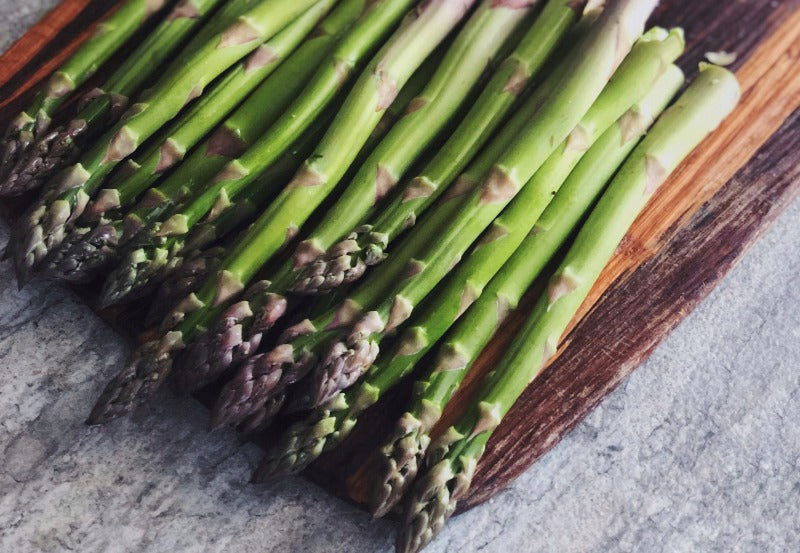Savory with hints of bitterness, asparagus is a popular dinner side dish. Bearded dragons tend to love it or hate it thanks to its strong flavor. If your bearded dragon happens to enjoy more of the earthy-tasting vegetables like broccoli, she might gobble up asparagus, too. So you might be wondering—can bearded dragons eat asparagus?
The short answer: yes! Bearded dragons can eat asparagus. But not every day.
How Often Can Bearded Dragons Eat Asparagus?
There’s good news for you if your beardie loves her veggies on the bitter side: bearded dragons can eat asparagus on a weekly basis. It shouldn’t be fed daily, and depending on what else is on your beardie’s feeding plan in a given week, you may want to offer asparagus every other week. Let’s take a look at the specifics on this nutrition-packed vegetable.
Here are some of the reasons asparagus is great for your bearded dragon’s health:
- Immune system. Antioxidants and Vitamin C help keep your dragon safe from disease and inflammation.
- Digestion. Fiber will keep things running as they should.
- Kidney function. Asparagus has potassium, which aids muscle function and strengthens the kidney. It also has a surprising 92% water content, which of course keeps your bearded dragon hydrated while improving kidney function.
- Blood and cells. Vitamin E not only prevents inflammation, but also builds up damaged cells, while Vitamin K regulates blood clotting and folate facilitates tissue growth and cell functions.
- Strong muscles. A little protein in asparagus helps your bearded dragon maintain strength and grow stronger.
As you can see, asparagus has quite a lot to offer. So what's the catch?

Why Can't Bearded Dragons Eat Asparagus Daily?
Unfortunately, asparagus has a few setbacks. Let’s take a look at the not-so-great aspects of asparagus for bearded dragons.
Too little calcium, too much phosphorus. Bearded dragons need a lot of calcium in their diet. Asparagus is very low on calcium, which is why it’s not a staple vegetable. What’s even more concerning is that asparagus has more phosphorus than calcium (the ratio is 1:2.7).
This can be dangerous for your bearded dragon because phosphorus will actually prevent the calcium from being absorbed into the blood. If your dragon eats a lot of food with more phosphorus than calcium, he can develop metabolic bone disease (MBD), which is a horrible condition no bearded dragon should have to undergo.
So definitely do your dragon a favor and feed this food weekly or less depending on what other foods he’s eating that week. For example, this week if your dragon is having a lot of bell peppers, which contain more phosphorus than calcium but are otherwise quite healthy, you may want to save asparagus for next week.
Moderate oxalates. Asparagus contains oxalates, that pesky ingredient that can cause so much trouble for bearded dragons. They prevent calcium absorption just like phosphorus and can also cause MBD. That's why it's important to limit asparagus, especially if your dragon has recently eaten some food with moderate to high oxalates. Even if your beardie loves this veggie, it’s better to be safe than sorry!
How Can Bearded Dragons Eat Asparagus?
You can actually feed your bearded dragon cooked or raw asparagus. Although it’s generally better to feed bearded dragons raw produce, in this case, one advantage to cooking the asparagus first is that the cooking process reduces the amount of oxalates. It also depletes the vitamins, so whether you serve it raw or cooked is up to you.
Here are a few tips to keep in mind when serving your bearded dragon asparagus:
- Whatever way you decide to serve it, buy organic asparagus when possible and make sure the asparagus is thoroughly washed before you do anything with it.
- If you cook the asparagus, cook it without oil, salt, pepper, or any other ingredients. They can make your dragon sick.
- Asparagus can be very stringy, which can be problematic for dragons if the pieces are too big. Chop the raw or cooked asparagus into very small pieces so your bearded dragon won’t choke.
Asparagus can be a wonderful supplement in your bearded dragon’s diet. Feeding it weekly will help your dragon maintain a proper intake of calcium to prevent metabolic bone disease while reaping the many benefits of this healthy vegetable.
Got questions or feedback? Please email us at team@dragonsdiet.com








